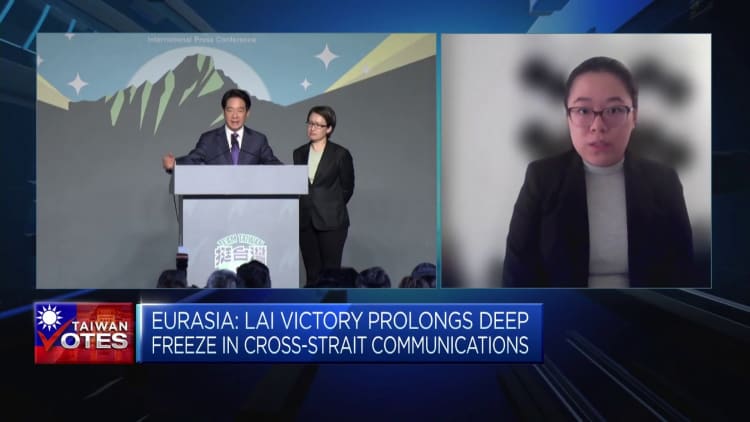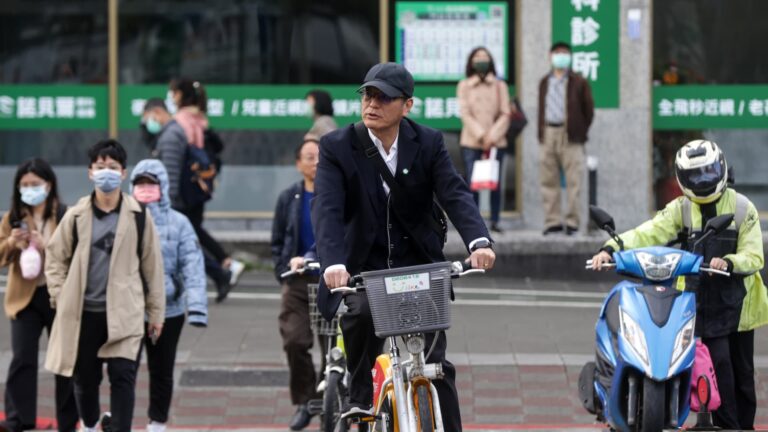Pedestrians cross a road in Taipei, Taiwan, on Monday, Jan. 15, 2024.
Bloomberg | Bloomberg | Getty Images
Taiwan’s economy faces uncertainty as tensions with China are likely to rise following the victory of the Democratic Progressive Party in the island’s presidential elections, with analysts’ views differing on the question of a slowdown.
Risk perceptions of the Taiwanese market are expected to strengthen even though a DPP victory was largely factored in, with the market’s response hinging on China’s reaction in the coming weeks and months, Amundi Asset Managment said in a note last week.
The firm warned: “If China were to impose a customs quarantine – banning major imports and exports and allowing only essential foods and fuels into the country – concerns about supplies and social unrest could arise. Such a scenario would likely lead to a depreciation of the Taiwan dollar and impact both the real estate and stock markets.”
Alicia Garcia Herrero, Nataxis’ chief economist for Asia Pacific, however, expects Taiwan to see faster growth in 2024, offering “tailwinds” to the DPP government, as mainland China remains Taiwan’s biggest export destination despite tensions.
Amundi warned a possible temporary economic blockade of Taiwan could alarm the markets.
A more extreme scenario of a full blockade that prohibits all imports to Taiwan will trigger a regional “risk-off” event, severely impacting Asian stock and real estate markets and leading to foreign exchange shortages, it said.
A blockade “isn’t out of the question,” but “highly unlikely,” Gabriel Wildau managing director at global business advisory firm Teneo said, adding that while the DPP’s Lai Ching-te has had a history of pro-independence rhetoric, his presidential campaign was quite tempered.
Political status quo, economic worries
On Jan. 13, Taiwan delivered an unprecedented third presidential term to the ruling DPP’s Lai, considered a China skeptic.
Wildau said the base case for Taiwan would be a continuation of the status quo, “which features regular military exercises near Taiwan and a refusal by Beijing to engage directly with a DPP-led government.”
Beijing will observe Lai’s statements and actions until he takes office on May 20 before issuing a full response, he writes in his Jan.14 report.
“At least in his first year, if not his entire term, I expect Lai will emphasize continuity with President Tsai and avoid any risky provocations, so I don’t expect Beijing will feel compelled to respond with a blockade or other highly aggressive actions.”
His view is also shared by the Economist Intelligence Unit, which said in a Jan. 15 note that both a declaration of Taiwanese independence and a Chinese invasion of Taiwan remain unlikely.
However, the report added that “questions around Mr Lai’s presidency could preserve some risk concerns regarding Taiwanese assets in the first half of 2024.”
Loss of legislature to temper DPP stance
The DPP won the presidency, but it lost its majority in the the Legislative Yuan — Taiwan’s parliament.
The party garnered only 51 seats in the 113-seat Legislative Yuan, with the opposition KMT winning 52 seats and the Taiwan People’s Party securing eight, which essentially guarantees a split parliament.
There will be extensive discussion among Taiwanese parties for policy changes, with likely negotiations between mainland China and Taiwan’s opposition parties pressuring the ruling government to explore more dialogue with mainland China, Nataxis’ Herrero said.
Teneo’s Wildau said Beijing was likely to continue refusing official dialogues with the DPP presidential administration, but could pursue conversations with KMT leaders.

Beijing could revive negotiations around the stalled Cross-Strait Service Trade Agreement and Cross-Strait Goods Trade Agreement negotiated in 2013 by the KMT government that aimed at liberalizing trade between Taiwan and China, Wildau added.
However, the CSSTA was unratified by Taiwan’s parliament in 2014 after it sparked protests from students and civic groups in Taiwan, known as the Sunflower Student Movement.
Wildau said this could offer an opportunity to help the KMT demonstrate that it is better able than DPP to deliver economic benefits from the mainland.
The DPP under Tsai has advocated a “New South Bound Policy,” to enhance trade and exchanges with 18 countries in Asia, including the ASEAN bloc, in a bid to reduce Taiwan’s economic dependence on China.
In 2023, it was reported that Taiwan’s investments in the countries under the “New Southbound Policy” surpassed investments in China in the first half of 2023, standing at $2.126 billion, compared with $1.9 billion invested in China.
“Much more” investments from Taiwan went to the U.S. compared with China, according to Nataxis.
But the diversification drive could face a setback as DPP no longer has full control over the Legislative Yuan — Taiwan’s parliament.
Amundi analysts are less optimistic on diversification: “Economic disengagement from mainland China and an absence of sufficient compensatory support point towards lower long-term growth potential for Taiwan.”



